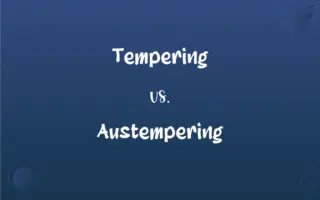Gilligan Controversy vs. Kohlberg Controversy: What's the Difference?
Edited by Aimie Carlson || By Janet White || Published on February 21, 2024
The Gilligan Controversy centers on critiques of gender bias in moral development theory, while the Kohlberg Controversy involves debates over the universality and stage structure of moral development.

Key Differences
The Gilligan Controversy emerged from Carol Gilligan's criticism of existing moral development theories, particularly those of Lawrence Kohlberg, for being male-centric. Gilligan argued that these theories did not adequately represent the moral reasoning of women, which she believed to be more context-dependent and relationship-oriented. The Kohlberg Controversy, on the other hand, involves debates over his theory of moral development, which proposes a stage-based model of moral reasoning evolving from concrete to abstract ethical principles. While Gilligan's critique is centered on gender inclusivity, Kohlberg's controversy focuses more on the validity of his developmental stages.
Gilligan's controversy highlights the importance of including a female perspective in moral development, suggesting that women approach ethical dilemmas with a focus on care and interpersonal relationships. The Kohlberg Controversy, in contrast, revolves around the universality of his stages of moral development, with critics questioning whether his theory can be applied across different cultures and genders. Gilligan emphasizes the diversity of moral reasoning, while Kohlberg's model is critiqued for its potential overgeneralization.
In the Gilligan Controversy, the critique extends to the methods of research in moral psychology, advocating for more qualitative approaches that capture the complexity of moral decision-making in real-life contexts. The Kohlberg Controversy often involves criticisms of his methodology, particularly the use of hypothetical dilemmas, which some argue may not accurately reflect real-life moral reasoning. Both controversies have in common a critique of research methodologies in moral psychology, but they focus on different aspects of these methodologies.
The Gilligan Controversy has broader implications for feminist psychology and the understanding of gender differences in moral reasoning. It has sparked a reevaluation of how gender influences ethical perspectives and decision-making processes. The Kohlberg Controversy, meanwhile, has led to a deeper examination of moral development models, considering factors like cultural variability and cognitive development. Both controversies have significantly influenced the field of moral psychology, but with different focal points: gender and inclusivity in the case of Gilligan, and universality and stage structure in the case of Kohlberg.
Comparison Chart
Primary Critique
Gender bias in moral development theories
Universality and stage structure of moral development
ADVERTISEMENT
Focus
Inclusion of female perspectives in moral reasoning
Validity of a stage-based model of moral reasoning
Research Methodology Critique
Advocates for more qualitative approaches
Critiques use of hypothetical dilemmas
Broader Implications
Impact on feminist psychology and understanding of gender differences
Examination of moral development across cultures
Origin
Emerged from Carol Gilligan's work
Rooted in debates over Lawrence Kohlberg's theories
Gilligan Controversy and Kohlberg Controversy Definitions
Gilligan Controversy
Advocates for the inclusion of women's perspectives in moral reasoning.
The Gilligan Controversy emphasizes the importance of understanding how women approach ethical decisions.
ADVERTISEMENT
Kohlberg Controversy
Debate over the stage-based model of moral development.
The Kohlberg Controversy centers on the validity of his six stages of moral reasoning.
Gilligan Controversy
Critiques methodologies of moral psychology research.
The Gilligan Controversy calls for more qualitative research to capture the complexity of moral decisions.
Kohlberg Controversy
Questions the universality of Kohlberg's moral development theory.
The Kohlberg Controversy includes discussions about the theory's application across different cultures.
Gilligan Controversy
Suggests women's moral reasoning is more context-dependent and relationship-oriented.
The Gilligan Controversy proposes a different perspective on how women solve moral dilemmas.
Kohlberg Controversy
Critiques the use of hypothetical dilemmas in moral development research.
A key aspect of the Kohlberg Controversy is the critique of his hypothetical dilemma methodology.
Gilligan Controversy
Influenced feminist psychology and gender studies in ethics.
The Gilligan Controversy has been pivotal in shaping modern feminist approaches to moral development.
Kohlberg Controversy
Examines the potential overgeneralization of moral reasoning stages.
The Kohlberg Controversy raises questions about the generalizability of his moral stages.
Gilligan Controversy
Critique of male-centric moral development theories.
The Gilligan Controversy challenged the male bias in traditional moral psychology.
Kohlberg Controversy
Influences the field of moral psychology and cognitive development.
The Kohlberg Controversy has led to significant discussions in the study of moral and cognitive psychology.
FAQs
What did Gilligan argue against Kohlberg's theory?
Gilligan argued that Kohlberg's theory was male-centric and didn't adequately represent women's moral reasoning.
What is the Gilligan Controversy?
It's a critique of gender bias in moral development theories, emphasizing the need for female perspectives.
What are the stages in Kohlberg's theory?
Kohlberg's theory includes six stages, progressing from obedience to universal ethical principles.
How did the Gilligan Controversy impact moral psychology?
It led to increased inclusion of gender perspectives in moral development research.
Did Gilligan propose an alternative to Kohlberg's theory?
Gilligan proposed a different perspective emphasizing care and relationships in moral decisions.
How did Gilligan's critique influence feminist psychology?
It influenced feminist psychology by highlighting the importance of women's experiences in ethical discussions.
What is the Kohlberg Controversy?
It involves debates over the universality and stage structure of Kohlberg's moral development theory.
Does the Gilligan Controversy reject Kohlberg's theory entirely?
Not entirely; it rather provides a critique and an alternative perspective on moral development.
Does the Gilligan Controversy suggest different moral reasoning in women?
Yes, it suggests women's moral reasoning is more relational and context-dependent.
What methodologies did Kohlberg use in his research?
Kohlberg primarily used hypothetical moral dilemmas in his research.
How has the Kohlberg Controversy influenced educational practices?
It has influenced educators to consider diverse moral perspectives and developmental stages.
How does the Gilligan Controversy view ethical dilemmas?
It views ethical dilemmas as complex, involving interpersonal relationships and care.
What impact did the Kohlberg Controversy have on moral development theories?
It prompted reevaluation and expansion of moral development theories to include broader perspectives.
Why is the Kohlberg Controversy significant?
It's significant for questioning the universal applicability of a stage-based model of moral development.
Are Kohlberg's stages of moral development still used?
They are still referenced, but with an understanding of the controversies and critiques surrounding them.
What kind of qualitative approaches did Gilligan advocate for?
Gilligan advocated for approaches that capture real-life contexts and the complexity of moral decision-making.
How do cultural factors play into the Kohlberg Controversy?
The controversy involves how different cultural backgrounds may impact the progression through moral stages.
Is the Gilligan Controversy widely accepted in psychology?
It's widely recognized and has led to significant discussions and research in moral psychology.
What are the criticisms of Kohlberg's hypothetical dilemmas?
Critics argue they may not accurately reflect real-life moral reasoning and decisions.
How do the Gilligan and Kohlberg controversies compare in their influence on moral psychology?
Both have significantly influenced the field, with Gilligan focusing on gender inclusivity and Kohlberg on the structure and universality of moral development.
About Author
Written by
Janet WhiteJanet White has been an esteemed writer and blogger for Difference Wiki. Holding a Master's degree in Science and Medical Journalism from the prestigious Boston University, she has consistently demonstrated her expertise and passion for her field. When she's not immersed in her work, Janet relishes her time exercising, delving into a good book, and cherishing moments with friends and family.
Edited by
Aimie CarlsonAimie Carlson, holding a master's degree in English literature, is a fervent English language enthusiast. She lends her writing talents to Difference Wiki, a prominent website that specializes in comparisons, offering readers insightful analyses that both captivate and inform.







































































